- Contents
As the world continues to undergo drastic changes, there is a greater need than ever for systems that drive the mindset of individuals to think independently and take on challenges in order to create the strong organizations that companies need.
With this in mind, Fujitsu has developed the Fujitsu Way, as well as its Purpose, which forms a major axis of the Fujitsu Way, and has introduced a new evaluation system called Connect from 2021 with the aim of realizing these initiatives.
In this article, we will feature a conversation between Ikujiro Nonaka, Professor Emeritus at Hitotsubashi University and Fujitsu’s Takahito Tokita (CEO) and Hiroki Hiramatsu (Corporate Executive Officer, CHRO) that explores Fujitsu's Purpose-Driven Management and its new evaluation system from a global management perspective.
The Ideas Behind Fujitsu’s Purpose
Hiramatsu: We at Fujitsu defined our purpose in 2020, to make the world more sustainable by building trust in society through innovation. Based on this new purpose, we also revised the Fujitsu Way.
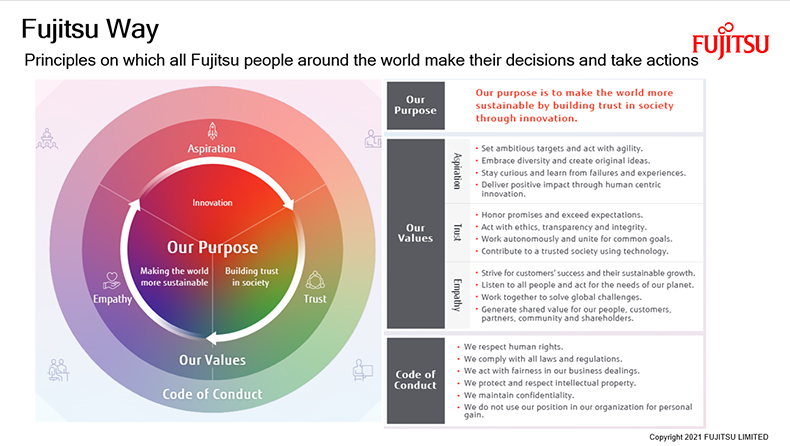
Nonaka: In terms of an academic point of view considering the field of business administration, we are currently experiencing a period of great change. Conventional analytical and scientific management tend to work well in a static environment, but in an environment in the midst of constant change, empathy is the key. In such an environment, how do we build strategies and face challenges together? If empathy is not sincere and becomes supposition, this will only lead to pandering and true understanding will not occur. It is only through “intellectual combat” and working through mutual problems with customers that empathy and trust can be created, and innovation (aspiration) can occur.
I was impressed when I learned about the Fujitsu Way, which sets forth the values of aspiration, empathy, and trust, which are key concepts at Fujitsu. I was also impressed by the fact that a Japanese company created a universal management philosophy with a theoretical background.
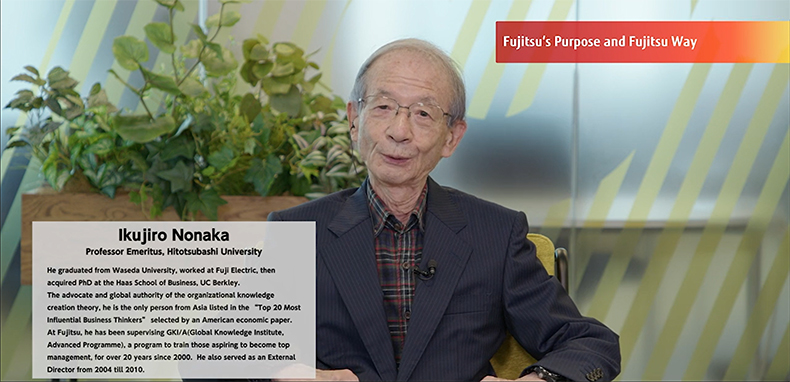 Ikujiro Nonaka, Professor Emeritus Hitotsubashi University
Ikujiro Nonaka, Professor Emeritus Hitotsubashi University
Tokita: When I was assigned as CEO, I was proud of Fujitsu for its very strong sense of “customer first” responsibility. On the other hand, based on my own experiences working as a system engineer in the field, I also felt that the company was too close to its customers. In the midst of rapid changes in society, customers are looking for the way they should be, the means to respond to change and above all, speed. In order to achieve that, we need the strength of each Fujitsu employee on the frontline. However, within any large organization individuals are in a way being suppressed and their ability to take steps toward what they want to do and the will to do the right thing are weakened. I think this way too, and so I feel all the more strongly the need to keep an eye on the strengths of the individuals.
In order for Fujitsu as a whole to become stronger, After all, I think there’s a need to put together the wisdom and diverse strengths of our 130,000 people across the globe. And through intellectual combat and discussion, as Professor Nonaka explained, we hope to build trust and create empathy with our customers in a way that embraces the whole world. If this can occur, a kind of centrifugal force that encourages individual action will follow. Therefore, we’re required to maintain a centripetal force as an organization at the same time. It’s a purpose that all Fujitsu employees can sympathize with that will work as such a force. Fujitsu’s very raison d’etre is to maintain the centrifugal force and turn it into a great power. I believe that is the responsibility of Fujitsu as an organization.
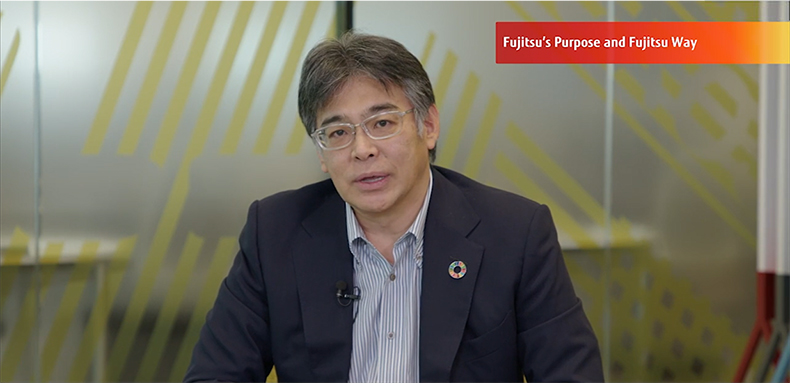 Takahito Tokita, CEO and CDXO, Fujitsu
Takahito Tokita, CEO and CDXO, Fujitsu
What is Humanizing Strategy?
Nonaka: In the Fujitsu Way, you have built a broad roadmap to create a new future while still looking back at the history of Fujitsu, as well as the Code of Conduct to put this into practice. The Code of Conduct must be presented in a way that hits home with each and every employee or it will not be accepted. The Fujitsu Way is a model for continuing to pursue “what is true, good, and beautiful” in the midst of change.
Tokita: That’s right. Our Purpose and the Fujitsu Way are not merely sets of principles or rules, but rather initiatives that condense the DNA formed within Fujitsu's rich 86-year history. To come up with the words that would strike true on the hearts of all our 130,000 people, in this day and age.
Nonaka: Hearing that, I was convinced of Fujitsu's current path and company image. The first step is not to analyze but to wish, and then to tirelessly pursue truth, goodness and beauty in your practices. So, when a story and the Code of Conduct are combined, this new meaning of strategic theory as Humanizing Strategy makes sense, doesn’t it?
I have the feeling that the Fujitsu Way is not just the path of a single company, but also a path to revitalize the world, including the country of Japan. With this in mind, I hope that Fujitsu will continue following its principles.
Connect: Fujitsu’s New Performance Management With the Goal of Actualize Our Purpose
Hiramatsu: In order to actualize our new Purpose as well as the Fujitsu Way, we will introduce a new performance management that we call Connect in 2021. Using Fujitsu's Purpose as a starting point, the leader of each organization will share that organization's vision with the team members, including the leader’s own thoughts and feelings about how much of an impact they have made toward that vision. In addition, we have revised the system so that it is more consistent in evaluating how much each individual has grown based on his or her personal path.
The most important thing is how the leader of the organization can create an attractive and challenging vision. I believe that this will be the catalyst that inspires the empathy of their team members and that drives the mindset of each individual to think for themselves and take on challenges.
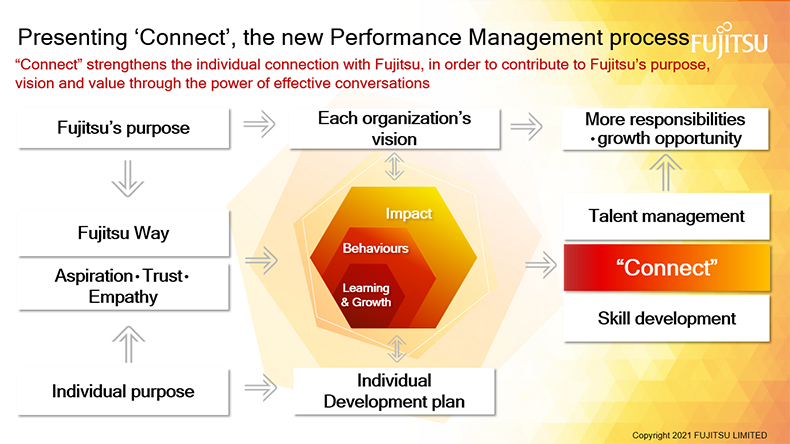
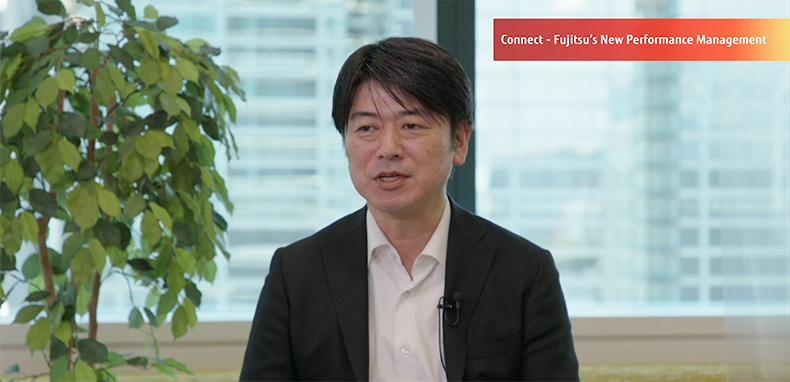 Hiroki Hiramatsu, Corporate Executive Officer CHRO, Fujitsu
Hiroki Hiramatsu, Corporate Executive Officer CHRO, Fujitsu
Towards an Evaluation System That is Not Just a Tool But Also a Way of Life
Nonaka: In the past, when we included things like goal management in evaluation systems, somehow these systems didn't work well. That's because the system was just a tool and not an indicator of how to live and act. This new evaluation system Connect considers how to live and act, and includes a range of evaluation mechanisms that promote innovation.
The critical difference between the old evaluation system and Connect is that you have created consistency in performance while presenting Fujitsu’s Purpose, a roadmap, as well as the Code of Conduct that guides the employees’ lives and actions, in the goal management system. I think that it is important to view these different parts as a single system. Yet, at the same time, I had the impression that the system manages to incorporate a sense of balance between sustainability and a “no one left behind” approach.
Tokita: Fujitsu stated to practice purpose driven management after setting its purpose in 2020.So we’re just beginning to take on that challenge. We’re asking ourselves what’s purpose management? And how should the people-focused system we will establish be designed to work within its frame? I think there’s still a lot of room for improvement in this.
I’ve been for so long and am still possessed with the question of how to have all our 130,000 people work together to actualize our purpose. Not only that but how can each individual become stronger by focusing on his or her own Purpose? And how can each individual grow while innovating toward a single goal? As Professor Nonaka said, this is not a tool or a system, but rather an appreciation of how each employee lives, works, and collaborates with others, and I believe that this evaluation system should itself be evaluated by our employees. In that sense, I think we were successful in making it work for us to look straight in the face of whatever issues that may come out of our communication with the people about it, or of any other problems it may cause.
Fujitsu's Goals for Purpose-Driven Management
Tokita: We talked about just exactly what Humanizing Strategy, a corporate strategy was for. Ultimately, it’s intended for the people who work at the company to live and work with gusto. It’s no longer about making money or things like that. I feel like I was reminded anew of this. Now really, Fujitsu has just only begun engaging in its purpose driven management. The new performance management we named Connect is also still at its start. We need to make them both grow. That responsibility lies with us in top management, but we’d like all of our people to join in the efforts to improve them. We hope, thereby, that they really become the reference for the world, to create many opportunities for change, as well as a better global environment. We also must work to create an era of carbon neutrality in the years to come, towards 2030, then towards 2050.
And I’m fully aware that there are many young people at Fujitsu who’ll be occupying the Center Stage in the Carbon Neutral Era I just mentioned. For their sake also, I must immerse myself in management.


